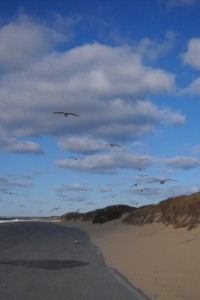
In a land of restricted freedom, where there were hills, seas, windmills and bees and vast fields that stretched to the horizon save for an instance or two where there were houses, beautiful but small houses that had the courage to fight wind, rain and snow, there was a small puffy cloud, a solitary object in the sky – so it seemed to human eye – it seldom moved except for a glance or two to the left or right. It hung about all day and all night unlike its mates that traversed the globe as if on a probe.
Kids played the light and shadow game when clouds on a trail of wind silently hovered past them. So they would assume that sunlight would burn them and in the shadow they have to stay. If sun kissed a hand or feet or head of a kid boy or a girl instead, they would lose half their share of the boiled corn they had after the game. One smart girl Jill and one boy Jack had keen observant eyes through which they had noticed the small puffy cloud, a solitary object in the sky. And they had also identified his shadow, under which they would always stand, winning corn after corn, day after day.
Migrating birds often spoke with him – the small puffy cloud, a solitary object in the sky – they would tell him the story of their friends, a swallow who met the happy prince or an albatross that was killed by a sailor and he would fill up with tears. Then he would bid them farewell as they flew further in the melancholic evening sky, leaving him feeling lonelier than ever.
A local bird, a sparrow brown, one day flew up to him, ‘knock, knock’ he chirped, then cleared his throat and pulled a breath within,
‘You are a cloud, you have a gift
Why not you take a trip?
You are aloft just be adrift,
Go on and sail your ship!’
Silently but the cloud looked in the sparrow’s eyes. Something there was that he wanted to say, but stopped himself from doing so. The sparrow flew over him and under him and then encircled him once. He chirped in his ear, then dashed to the ground and brought some millet seeds for him, thinking that he’ll be hungry and thus sad, so he’ll eat them and be happy. But the sparrow didn’t know two things: one, the cloud wasn’t hungry and two, clouds don’t eat millet. The cloud however was touched by this gesture and decided to share with the sparrow his mind.
‘My mates they go on trails of wind,
I want that not for me,
The winds are strong, they skyward go,
I want them not for me.’
The sparrow stayed with the cloud for some time but decided not to dwell any deeper, so he wordlessly flapped his wings. After a moment had passed he unhurriedly descended to a place where some other sparrows were half-busy eating a meal of millet seeds and grains of rice that a human had scattered for them. The sparrow brown, sat down and chirped and shared with other sparrows what the cloud had shared with him. And then to an elder looking sparrow he posed a few questions,
‘Why do you think the cloud is sad?
What makes him still and pale?
What pain is hiding in his heart?
What is his dreary tale?’
The elder looking sparrow lifted his head and looked at the cloud. A gush of wind mildly shook the tree they were sitting under and twenty-four leaves fell. Some falling leaves blocked out the sun for a fraction of time from the sparrow’s view and he saw the sun like a star – twinkling. The twirling leaves landed softly on the ground. Other sparrows looked at the elder and wondered what he must be thinking. The elder looked at the small puffy cloud, resisting the push of the wind. He then looked at the sparrow that had just visited the cloud and chirped,
‘Some rustling leaves, they tell a tale:
There was a breeze in love.
A cloud she had to take with her,
A cloud with her in love.’
A unanimous cry of, ‘then what happened?’ broke out among the sparrows. They had not known the cloud within had held a broken heart. They all lifted their heads to see the small puffy cloud, a solitary object in the sky, bathed at that very moment in the colours of the sun, the sky and the shadows. The sun was casting its yellow light at it, which the cloud’s cotton-white surface reflected in splendid fashion. The blue colour of the sky was giving an illusion as if a part of the cloud were blue too. And then between the two of those, amid the puffy texture of the cloud there were areas unexposed, parts of the cloud which neither the sun had seen nor the sky. Those areas were filled with the cloud’s own shadow. The elder sparrow then spoke again and this time leaving everyone not only surprised but a little saddened too.
‘Their story ends in much dismay,
Like stories most of love,
A strong wind took the breeze away,
And robbed the cloud of love.’
Hearing this, the lady sparrows almost broke in tears, however the men sparrows contained their emotions as ‘men don’t cry’, so they had been told by one of their elders who had heard a human say that to his boys. They then decided to go to the cloud and ask him the entire story. They wanted to hear it for themselves; they wanted to know what happened. Some of them wanted to know how it all began while some just wanted to know whether or not there was a big fight in the end. So they all took off and gradually ascended to the level of the cloud, then joined the tips of their wings as they encircled him and formed a ring of sparrows.
The cloud knew the sparrow custom. He had seen this enough times. He knew that when sparrows form a ring around someone or something, they want to know more about the person or thing. So he let out a big sigh and the blades of the windmill rotated thrice. The sparrows were quickly distracted by the sound of the windmill as they always kept half their senses alert for all possible dangers. At that moment, the other half of their attention was on encircling the small puffy cloud, a solitary object in the sky. On the ground below, three kids looked at this spectacle in wonderment. Beneath the firmament, floating in mid-air was a cloud surrounded by a host of sparrows and at a distance from them to the left, facing the kids was a windmill, the blades of which were turning. Near the feet of the windmill was an old barn attached to a farm and at one corner of the farm was a wooden house that was weary, old but welcoming like the old man who owned it.
‘We wish to know’ the sparrow who had earlier flown up to the cloud chirped,
‘We wish to know a love-lit tale,
Of which the flame burns low,
A tale that which now gives you pain,
A pain you do not show.’
The cloud closed his eyes and then opened them. The sparrows were in front of him. He drew in a deep breath and spoke,
‘To the hour of death it prolongs,
What is this life but love?
Ending in such a darkness cold,
Starting in warmth of love.’
He then closed his eyes again and started narrating his story. He told them that it was February and he was young and energetic, unlike what he was now. He always wanted to grow big, a mega-cloud that clouds and people would be in awe of. However he did not want to follow the herd and travel the world on a trail of wind. He wanted to go about things at his own pace, he wanted to see the world, learn new things, share things with other clouds and people that he knew, but all elder clouds kept telling him that he can’t see the world as he wants to see it, he would need to see it the way that everyone sees it because that is the way it has always been and that is the way it will always be.
The cloud told the sparrows that he said to the elder clouds that he won’t blindly follow what has been happening for so many years. He told them that he was sure there were other ways of looking at the world. He chuckled when he told the sparrows that his elders thought that the destiny of a cloud, the sole purpose of a cloud was to go and rain somewhere. He told them that he was so happy when kids used to play the light and shadow game under him, it felt empowering to know that he’s serving a different purpose in life than just going and raining somewhere.
He said to the sparrows that one day he was in the hills and it was that time of the year when clouds new and old take leave for their voyage. His elders told him that he had to go this time or he would be banished from the clan. He got scared after hearing this because where does a young cloud go? So he decided, against his heart that he will trail the wind. And so on a cliff in a queue they all stood, and as soon as wind came they climbed on it. They travelled through day and through night over vast stretches of land both clean and infected with human population. Until one evening they approached a village over which was spread like an ominous presence a gigantic dark cluster of storm clouds. The storm clouds looked at them and thundered. As soon as they did this, all his companions quickly went towards them and became one of them. He was terrified at the sight of it because he never wanted to rain, let alone with all that tantrum. So what he did was something that few clouds dare to do, he unhooked himself from the trail of wind and hovered in a different direction.
As a result he lost altitude and slowly started sinking through the sky. He thought it was over for him, as clouds don’t survive at ground level except for those few occasions when conditions are favorable. Feet after feet, the count decreased and he fell through the sky and just as all hope was about to be lost, something caught him. A fragrance that he remembered to the present day, a mystery that makes the daffodils toss their head in sprightly dance, an aura that people feel when they’re out on a picnic, what rustles the leaves, what whistles through open windows, what cools the forehead on summer afternoons… the puffy cloud was caught by the gentle hands of a breeze.
And that was it. That moment was all it took for him to fall in love with the breeze. The warmth of that embrace was enough to make all other comforts of the world seem less comfortable. The breeze slowly hoisted him to an altitude where it was safe for him to be afloat and then she left him. He thanked the breeze for saving his life and told her at that moment how strikingly beautiful she was. The breeze did not reply but looked at him a moment and then moved on in the same lively manner.
The next day he again trailed the same wind and unhooked himself at the same spot. And as he had expected, he met the breeze again. He gave her a charming look and said,
‘I’m poisoned by your breath my love,
Imprisoned by your love,
My body travels dawn to dusk,
My heart stops in your love.’
The breeze heard this but did not reply. She looked at him a moment and then moved on as she did the previous day. Only this time her manner was not as lively. The cloud told the sparrows that he thought he might have been abrupt in some way but he decided that he will return and so he did. The next day he again trailed the wind and reached the same spot. The breeze was there, fulfilling her duties in the most pleasant ways of the world. Playfully tickling a neck here, slightly moving a hat there. He saw her gliding through those trees, collecting fragrances from flowers, dropping them in women’s hair. He decided not to disturb her but to remain a silent spectator of her activities. So he stood there and watched all her chores that looked like miracles to him. How she walked on the lily pond cooling herself on a hot day, how she helped a child take his kite to a cloud, how she took the pollens from one flower to another. Then she felt a presence, or maybe felt it before but chose to acknowledge it at that moment, and she went closer to him.
‘Why have you anchored here o cloud,
Is here your work today?
Why do you stand and gaze at me,
Like you are here to stay?’
She spoke to him and he replied,
‘If emotions had colour then,
What colour would be love?
Your stance and dance and melody,
Your colour would be love!’
She gave him a look that only appears in the eyes of a lady, when she says everything and doesn’t utter a syllable. At that moment, she was confused. Not about his feelings and nor about her feelings. She was confused as to what answer she should give him. So she thought a moment and then said,
‘Now on several occasions,
Since you have here stopped by,
And you look at me in wonder,
You come back in July.’
The cloud told the sparrows that he turned back and left from there after the breeze said those words to him. But he returned there next day and the day next to that and then the entire week and the entire month. He came there every single day till the sun declared it the morning of the first day of July. He was overjoyed with his achievement, which was nothing when you come to think of it, but he was overjoyed that he had passed a test. He had not spoken to her or interfered in her work. He just had been a part of the environment in which the breeze existed too, and for him, that was peaceful enough.
In February it was that he first saw her, at the time of winter’s closing ceremonies. Through spring he had watched her help spread the blossom. In summer he stood through the tormenting heat of day. It was now that he wished to ask her out. To come with him on a tour without destination. To see the world at his own pace, but not alone and with a partner. So he tried to make eye contact with her and eventually he did. He even broke into a random dance to get her attention. In the evening when she was done with her duties and it was time for the night breeze to take over, she came to him. He rose in revelation. He smiled and humbly spoke,
‘In winter, spring and summer days,
In rainy nights of love,
Of silence does the cuckoo sings,
Your silence to my love.’
The breeze glanced away. Her forehead moistened. Feet quivering in restlessness. Breathing shallow. He asked her if she was alright to which she nodded her pretty little head and a tear dropped below from her eye. He asked her the reason of her restiveness and she told him that she can’t. The cloud told the sparrows that the breeze told him that she can’t say yes to the love-filled advances he had made at her. She can’t approve of the feelings he had developed for her. She can’t be in love with him. But the cloud said to her that she can do whatever she wants to. He said to her, that the only thing that matters is whether or not “she” wants to. So he asked her again,
‘O breeze, o gentle calming breeze,
With you I am in love,
With you I wish to rove the world,
With me are you in love?
The breeze heard this and her teary eyes lit up in a smile, which she quickly doused. She then spoke,
‘Cupid with his golden arrow,
Has pierced my heart with love,
With you I wish to rove the world,
I’m told but not to love.’
The cloud told the sparrows that he again said to her that she doesn’t have to do what always has been told to her. He said to her that they can always write their own destiny. He said that he wanted to live his life as he had dreamed of it to be and not as a byproduct of his dreams. The breeze told him that she was afraid to make such a decision, to take such a step. She was always too protected and too detained by her father, the wind. He told her that she does not have to ask her father anything and then suggested her that they elope. The breeze was startled to hear such a thing from him. She was petrified at the thought. However he persuaded her; influenced her and convinced her with his love that the next day when she comes, they would run away.
So the next day came and the sun took its spot in the sky and trees all stretched out of their sleep. Flowers spread open their petals like ramps on which butterflies would waltz and birds surveyed the sky as worms hid to avoid their gaze. On a cliff, in a queue the cloud stood for a trail of wind so he could reach the place where he would meet his lovely love, the breeze. The wind came and took the cloud and when the spot of separation came, he parted from the crowd. He unhooked himself from the trail of wind and drifted in the direction of the place where the gentle breeze all day long roams about, sings about. That day her song had a tense note about it. A dense note thickened with worries of an unknown outcome of the decision they had made.
She saw the cloud and the cloud looked at her; his present from the past for a splendid future. He was happy that day, excited, thrilled! Hand in hand they left from that place, the breeze in front and the cloud catching up behind her. To Europe they thought they would first go, so they headed there. In England they floated over hills and between valleys, they saw a fair gentleman with long hair over his ears wearing a poet shirt, lost in poetry of thoughts. He looked at the cloud and smiled as if his childhood were still alive in him; the cloud said hello but the man only interpreted it as mild thunder and closed his eyes feeling the breeze cool his shirt. They saw the same man again one year later when they were returning from Amsterdam, sitting beside a lake, beneath the trees, amid a host of golden daffodils.
In France they went to Paris and cuddled along the Seine. On cobble-stoned streets people sipping on red wine. They saw an iron lattice tower built in 1889 for the World Fair from an angle that people seldom see. Hovering over it like a bee. At the Place des Vosges they had fun, over the green grass in the sun. In Italy, they went to Venice. The palaces, the piazzas, the canals and the bridges over them. They wanted to be lost there forever—traverse the lagoon, whistle about the alleyways, take in the aromas from all those canal-side cafes. And then they went to Florence, a work of art more than a city. They absorbed a panoramic view of it from Giardini Bardini, the Bardini Garden. At sunset, while floating over the Michelangelo Park, they saw the Ponte Vecchio. The sky in a pale tint of orange near the horizon and golden over the head was spread above red rooftops all the way to a skyline of rolling hills. Behind the Ponte Vecchio, the silent seeming Arno, reflected the sky and appeared like a glossy river of gold.
They also went from Casablanca to Cairo, from Amman to Tehran, from Kabul to Kashmir and then they travelled from China all the way over the great Pacific into Peru. In Peru they dawdled over the Nazca desert, admiring the Nazca lines; they sauntered through the Sacred Valley, which once was the heartland of the Inca Empire; they maundered in Machu Picchu, the Mecca of mysteries. From there they flew to Santiago and from Santiago to Buenos Aires. From Buenos Aires they decided to go to Rio de Janeiro and so they set sail over the South Atlantic and entered Rio from its coast. There, they heard someone speak of Pico de Neblina —the highest mountain in Brazil— so they headed its way. When they reached there, they learnt that Venezuela was just 700 meters away, so they chose to venture there as well. They entered Venezuela in the Serrania De La Neblina National Park and loved the open green fields and cloud filled skies.
While roaming about in that section of the Guiana Highlands they encountered the father of the breeze. He was frantically curving about, through large grasslands. They stopped at the sight of him. The wind saw them too and went near them. They froze in fear. The force of the wind almost pushed the cloud away, but he held on. The wind stood right in front of them and held the breeze’s hand in his grip. Seeing this, the cloud intervened. The wind tossed the cloud aside, he was small and weak. No match for the old wind that blows from west to east. He questioned as to why they had eloped, he asked that did they not know that things were supposed to happen as they always had been happening; he summoned the cloud to explain that how could such an irrational thought even come to his mind?
‘I would not think of such a thing,
In hundred years but love,
Took me out of a labyrinth,
And showed the path of love.
I now can clearer see the world,
To me is dearer love,
My love is monotheistic, wind,
I love none but my love.’
The cloud’s reply angered the wind. He surged forward. The breeze’s hand was nearly crushed with the force of his grip. The wind held the cloud with his gigantic right hand and started to squeeze. The cloud was scared.
‘Let him go!’ the breeze cried. The cloud struggled. The wind overpowered them both.
The cloud told the sparrows that so much and all at once had never played in his mind. The happiness, the struggle, the love, the contempt. And amid all this at some point he lost half his consciousness. He slipped into a dream where he saw himself sitting under a shade in a garden on a sunny day with the breeze around him. There were bluebirds and the melody of a flute. The gardener had grown lily of the valley, stephanotis, white violets and dandelions in plenty which were spread aesthetically around him. Then slowly in his dream the scene changes, it gets windy and the petals rip off the flowers and thorns appear instead. The fragrance of the garden vanishes, the breeze is not in sight. The chair that he was sitting on turns to a garrotte and the noose around his neck tightens. He gasps and he chokes as his eyes water. It starts to rain. He looks up to see the breeze looking down on him and crying in pain. He tries to reach out to the breeze but he can’t. There is a physical distance between them in which the wind is strongly present. His environment starts to blur and it blurs to the extent that nothing is visible. And then the light starts to fade, fading to the extent that it all turns to black.
When he came out of his dream he found himself next to a quiet mountain in Venezuela. The wind was not there and neither was the breeze. He was alive but felt no sensation, except the pain in his neck. He was parched so he tried to drink some water but he couldn’t; the pain in his throat would not let him swallow. He called out to the wind but he was barely audible, so silently he flew. For two days and two nights without food or rest he looked for the breeze. He had travelled across the length of Venezuela and reached the Caribbean Sea. From the Caribbean he floated towards the Gulf of Mexico devoting another day and another night to his search. And by the time he crossed the Gulf of Mexico to enter Mexico it had already been five days since he had last seen the breeze.
The cloud told the sparrows that it was then that he found this place, the place where he silently hovered in the sky. He was passing by above this region when he saw a corn field nearby and a windmill and some children playing near a barn and houses that seemed to be built by honest hardworking people, so decided to halt. The sun cast his shadow on the ground. Soon there was a trail of wind carrying some clouds and the children started playing the light and shadow game. The sight of those children playing under his shadow gave him peace. It acted like an aid he was in much need of, so he decided to stay. Stay at the same spot for the rest of his life.
The sparrows all looked amazed with the intensity of the story, flushed with emotions, when one of them asked.
‘Your story melts my heart o cloud,
But what happened of love?
To where the wind did take the breeze?
To where he took your love?’
The cloud looked at him for a long time, as if in his mind he was putting the right words at the right places before answering and then spoke.
‘Her father’s captive was the breeze,
She gave away her love,
To save my life she went with him,
Such courage had my love.’
When the wind had the cloud’s throat in a grip he gave a choice to his daughter. He said that she can come home with him and see the cloud live or choose to stay there and see the cloud die. ‘Let him live!’ The breeze at that moment with a heavy heart had made this difficult choice, she had promised her father that she would never come back to the cloud. ‘Let him live!’ So the wind had let him live. But these words still echoed in his mind. The last words he had heard from the breeze before he passed into an unconscious state. These words haunted his dreams and daytime thought-wanderings. ‘Let him live!’
Every day he looked forward to a time when he would cease to exist. Without the breeze his life was insignificant. Yet he lived because that was what the breeze had wanted for him. The cloud closed his eyes as the sparrows had gone back to their nests. The dusk had turned into night. The townsfolk were in their homes along with their families. The cloud opened his eyes just to take in all the companionship in his environment of which he was a solitary spectator.
About the Author







Comments